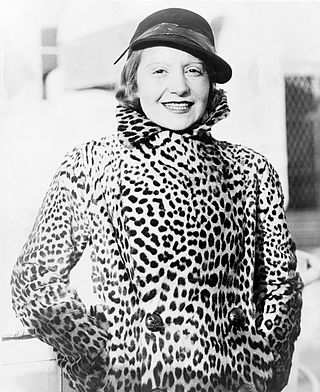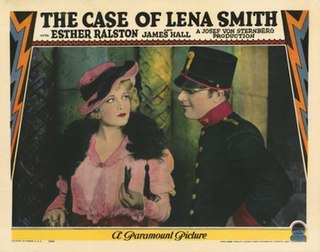
Elisabeth Bergner was an Austrian-British actress. Primarily a stage actress, her career flourished in Berlin and Paris before she moved to London to work in films. Her signature role was Gemma Jones in Escape Me Never, a play written for her by Margaret Kennedy. She played Gemma, first in London and then in the Broadway debut, and in a film version for which she was nominated for the Academy Award for Best Actress. In 1943, Bergner returned to Broadway in the play The Two Mrs. Carrolls, for which she won the Distinguished Performance Medal from the Drama League.

Olivier Assayas is a French film director, screenwriter and film critic. Assayas is known for his eclectic filmography, consisting of slow-burning period pieces, psychological thrillers, neo-noirs, and comedies. He has directed French, Spanish, and English-language films with international casts. The son of filmmaker Jacques Rémy, Assayas began his career as a critic for Cahiers du Cinéma. There he wrote about world cinema and its film auteurs, who later influenced his work. Assayas made several short films, and made his feature debut with Disorder in 1986.

Senta Verhoeven is an Austrian-German actress. She received many award nominations for her acting in theatre, film and television; her awards include three Bambi Awards, two Romys, an Adolf Grimme Award, both a Deutscher and a Bayerischer Fernsehpreis, and a Goldene Kamera.
Amos Vogel was a New York City cineaste and curator.

Werner Schroeter was a German film director, screenwriter, and opera director known for his stylistic excess. Schroeter was cited by Rainer Werner Fassbinder as an influence both on his own work and on German cinema at large.

Peter Tscherkassky is an Austrian avant-garde filmmaker who works primarily with found footage. All of his work is done with film and heavily edited in the darkroom, rather than relying on recent advances in digital film.

Birgit Minichmayr is an Austrian actress born in Linz, Austria. She studied drama at the Max Reinhardt Seminar in Vienna. For her work in Maren Ade's film Everyone Else she won Silver Bear for Best Actress at 59th Berlin International Film Festival. She is the only Austrian actress to win this award in history of the festival and the first Austrian actress to win best actress award at a major European film festival since 1956. She worked with several major European directors including Michael Haneke, Tom Tykwer and Jessica Hausner.

Ulrich Maria Seidl is an Austrian film director, writer and producer. Among other awards, his film Dog Days won the Grand Jury Prize at Venice in 2001.

The Case of Lena Smith is a 1929 American silent drama film directed by Josef von Sternberg, starring Esther Ralston and James Hall, and released by Paramount Pictures.

Peter Kubelka is an Austrian filmmaker, architect, musician, curator and lecturer. His films, few in number, are known to be carefully edited and extremely brief. He is known for his 1966 Unsere Afrikareise, and for other very short and intricately-edited films.
Anja Salomonowitz is an Austrian film director and screenwriter, specialised on documentary films with political or social background.
Tsipi (Tsipora) Reibenbach is an Israeli Film director, producer and screenwriter. Most of her work consists of documentary films dealing with painful issues in the Israeli society such as The Holocaust and Bereavement. Recipient of the Science and Arts Minister of Israel prize (1996) for directors and screenwriters. Her film "Choice and Destiny" is one of the most decorated documentary films made by the Israeli industry, among the notable prizes the film won are the Grand Prize in the Yamagata International Documentary Film Festival 1995, two Prizes in the International Documentary Film Festival Amsterdam 1994, and the Scam award (1994) in Cinéma du Réel festival in Paris, France. She received the DAAD scholarship in 2006 as a distinguished Israeli filmmaker.

Eve Heller, born in 1961 in Amherst, is an American filmmaker based in Vienna, Austria.
Joanna Parisi is an Italian-American operatic spinto soprano. She has sung many Verdi, Puccini, dramatic bel canto and verismo roles on stages in Europe, the Americas and Asia. She has also starred in operatic performances featured internationally in cinema and on television, such as Tosca and Carmen. In 2016, she was named as one of "The Next Generation of Great Opera Singers" by WQXR-FM.
The Austrian Film Museum is a film archive and museum located in Vienna, Austria. It was founded by Peter Konlechner and Peter Kubelka in 1964 as a non-profit organization.
Schwechater is a 1958 experimental short film by Austrian filmmaker Peter Kubelka. It is the second entry in his trilogy of metrical films, between Adebar and Arnulf Rainer.

Arena is a cultural centre in Vienna, Austria. From its 1970s origins in an abandoned former slaughterhouse used for the Vienna Festival, the Arena grew into a centre for alternative culture. It is located at Baumgasse 80 in the Landstraße district.
Adebar is a 1957 Austrian avant-garde short film directed by Peter Kubelka. It is the first entry in Kubelka's trilogy of metrical films, followed by Schwechater and Arnulf Rainer. Adebar is the first film to be edited entirely according to a mathematical rhythmic strategy.

Favoriten is a 2024 Austrian documentary film directed by Ruth Beckermann. It is a film about teaching and learning and the often very surprising experiences somewhere in between.












